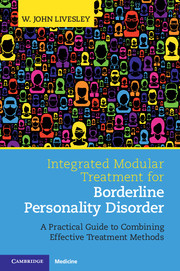 Integrated Modular Treatment for Borderline Personality Disorder
Integrated Modular Treatment for Borderline Personality Disorder Book contents
- Frontmatter
- Dedication
- Contents
- Preface
- Section 1 Introduction and Framework for Understanding Borderline Personality Disorder
- Section 2 Assessment and Treatment Planning
- Section 3 General Treatment Modules
- Section 4 Safety, Containment, and Engagement: The Initial Phase of Treatment
- Section 5 Improving Emotional Regulation and Modulation
- Introduction
- 15 General Principles for Improving Emotional Stability
- 16 Building Emotional Stability: Patient Education Awareness, and Emotion-Regulation Modules
- 17 Improving Emotional Processing
- Section 6 Exploration and Change: Treating Interpersonal Problems
- Section 7 Constructing an Adaptive Sense of Self
- Section 8 Retrospect and Prospect
- References
- Index
16 - Building Emotional Stability: Patient Education Awareness, and Emotion-Regulation Modules
from Section 5 - Improving Emotional Regulation and Modulation
Published online by Cambridge University Press: 16 February 2017
- Frontmatter
- Dedication
- Contents
- Preface
- Section 1 Introduction and Framework for Understanding Borderline Personality Disorder
- Section 2 Assessment and Treatment Planning
- Section 3 General Treatment Modules
- Section 4 Safety, Containment, and Engagement: The Initial Phase of Treatment
- Section 5 Improving Emotional Regulation and Modulation
- Introduction
- 15 General Principles for Improving Emotional Stability
- 16 Building Emotional Stability: Patient Education Awareness, and Emotion-Regulation Modules
- 17 Improving Emotional Processing
- Section 6 Exploration and Change: Treating Interpersonal Problems
- Section 7 Constructing an Adaptive Sense of Self
- Section 8 Retrospect and Prospect
- References
- Index
Summary
The previous chapter outlined the overall strategy of treating emotional dysregulation using four specific treatment modules. This chapter describes the first three modules: patient education, awareness, and increasing self-regulatory skills.
Patient Education Module
Providing information about the disorder is important because most patients are poorly informed about their condition. Some general information is provided when establishing the treatment contract (see Chapter 6) and managing crises (Chapter 13) but more information is now required about emotions and emotional dysregulation. The following topics outline what needs to be explained and discussed during this phase.
1. Emotions are adaptive: Many patients consider emotions as threatening or dangerous and hence they do not realize that emotions are an inherent part of human nature rather than harmful things that they need to “get rid of” or that emotions play a crucial role in responding adaptively to events. Examples that can be provided are how anxiety and anger alert us to important events that we need to deal with.
2. Emotions have a genetic basis: An understanding that emotions are adaptive and have a genetic basis helps to build tolerance and acceptance and reduce self-criticism.
3. Emotions provide information about the world and organize our experience of reality : Emotions tell us what is frightening and to be avoided, what is pleasant and should be sought out, and what is interesting and should be pursued. It is useful for patients to understand how intense and persistent emotions undermine the informational value of emotions and that an important treatment task is to reinstate the informational value of emotions by enhancing the ability to self-regulate emotions.
4. Emotions are important in setting goals and regulating behaviour: Since emotions tell us what is interesting and valuable, they help us to set goals and direct our efforts to attain them. Without this information it is difficult to establish major goals and long-term interests.
- Type
- Chapter
- Information
- Integrated Modular Treatment for Borderline Personality DisorderA Practical Guide to Combining Effective Treatment Methods, pp. 169 - 180Publisher: Cambridge University PressPrint publication year: 2017


